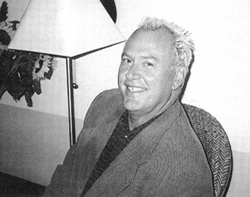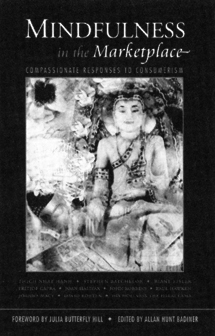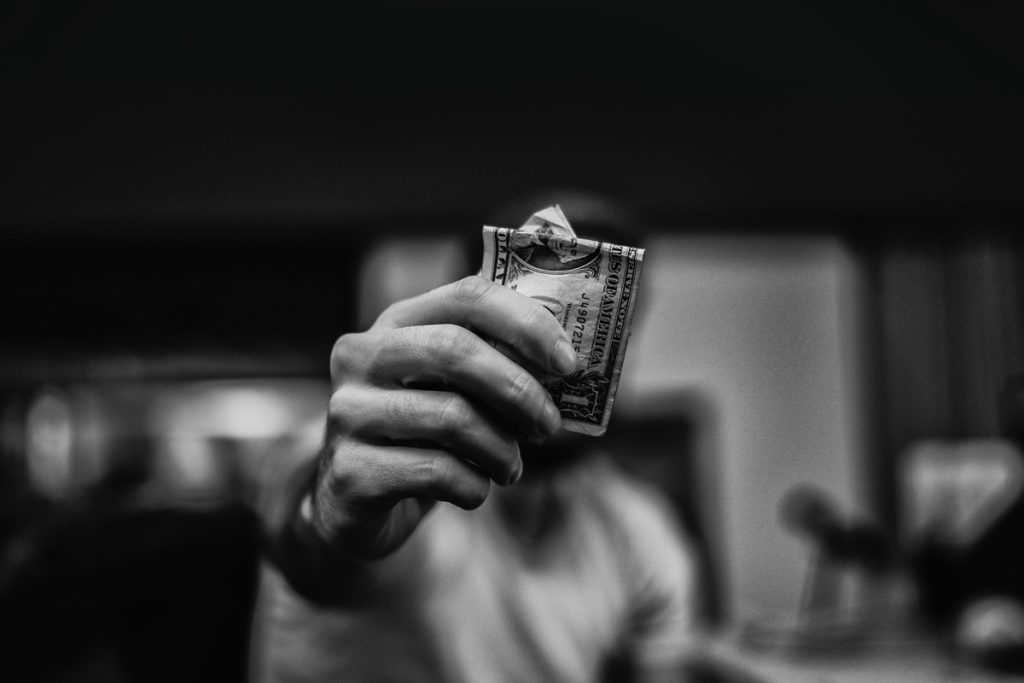Allan Hunt Badiner speaks to Tricycle’s managing editor, Peter Alsop, about his recent book, Mindfulness in the Marketplace, a collection of essays on consumerism through a Buddhist lens.
One of your essayists writes, “American life has been about ‘keeping up with the Joneses,’ but it is time we noticed that the Joneses are not happy.” Well, why aren’t they?

Ironically, when we have all of our material needs met, it brings into sharper focus what’s missing—in our relationships, for instance, or in our sense of self-worth. Also, the awareness that our current habits of production and consumption are slowly destroying the earth is gradually seeping into our consciousness. So, yes, the Joneses have a comfy SUV, but they are increasingly haunted by the awareness that it pollutes the air three times as fast as a regular car, and that others are paying a high price for their extra comfort.
What does Buddhism offer in the way of a critique?
It’s important to recognize that Buddhism does not offer a standardized critique; there is a broad range of views. In fact, Buddhism is inherently opposed to firm views on any subject. But certainly in the context of dharma teachings about awareness and personal cultivation, there arises a motivation to generate meaningful and compassionate responses to the destruction caused by consumerism.
The early teachings of the Buddha do address the issues of the marketplace and the economics of life at the time. And the Buddha was always a realist. From the Buddhist perspective of total interpenetration, economic activity such as production and consumption, and even the disposal of things, are not ends in themselves but always means to an end, which should lead to the development of well-being within the individual, the society, and the environment. Mindful consumption requires us to pay attention to the whole multitude of causes and effects that result from our lives as consumers. It asks us to learn about the issues, inform ourselves, and adjust our behavior accordingly.
In a culture that is so deeply integrated into the global economy, how effective can a Buddhist response to consumerism be? When identifying the origin of our sneakers is an exercise in macroeconomics, where do we begin?
It is true that it is a challenge. But I have to reject the idea that we can cultivate mindfulness on one hand and then, on the other, go to the marketplace and vote with our dollars for a world drenched in toxic chemicals and filled with inhumane workplaces and a rapidly disintegrating ecology. That doesn’t work. A true practice of Buddhism has to include a reorientation of ourselves as consumers, from passive purchasers who willingly and uncritically accept the advertising messages for harmful products, to active, mindful, responsible citizens who see the dynamic connection between our purchases and our values. How can we accomplish that? The Buddhist awareness of cause and effect needs to be seen in the smallest of our behaviors. The housecleaning product we’re buying: What impact does it have? What do its chemicals do to our groundwater? What does the production process do to the health of the workers who bottle it? What are the consequences to our health from constant exposure to the product? Mindfulness requires that we make these inquiries. Thankfully, there are many nonprofit organizations—such as Co-op America, Center for the New American Dream, Redefining Progress, Pesticide Action Network—that are helping to provide answers to these questions. We only have to tune in. And there is enormous power in the choices that we make.
Is “green” consumerism a solution, or is a more radical step required?
Mindful consumption goes beyond “green consumerism.” In the West, in particular, the challenge is really nothing short of forging a whole new identity, one that’s not dependent on our buying power, or the clothes and cars we have, or the toys we buy. This is harder to accomplish than it sounds; it’s a profound personal revolution, as any true Buddhist practice is.
But it’s easy to misunderstand the teachings. Recognizing the impermanence of life and of material things, for instance, we might wonder, Why be so concerned that the cosmetics we are buying are destroying whales? But the answer’s simple: out of sheer compassion. It’s the need to prevent suffering that requires us to inform ourselves and act accordingly.
The Buddha also spoke about consumption of sense impressions—what we take into our minds by way of our eyes and ears. Buddhism suggests that we cultivate a discipline of guarding these doorways of consumption: what movies we see, what books we read, and what images we are ingesting. So it goes beyond purchasing products. Mindful consumption is a deep, radical practice.
Several contributors to Mindfulness in the Marketplace argue that Buddhism in America has been co-opted by the consumer ethic. Do you agree?
To some extent. It’s hard to argue that any of us are immune to the values that are generated by global consumer culture. We’re in it, part of it, we’re even promoting it, in our lives and in the society at large. Buddhism, looked at as an institution in modern culture, which it is, is not only co-opted by the consumer ethic but also contributes to it. I mean, tickets to teachings by His Holiness are peddled by scalpers like big-name rock bands are. How much is that gorgeous Buddha in the window of your local antique store? Worse yet, how does your membership in the local zendo, your Buddhist identity, contribute to this false sense that you are better than the great masses of humanity that, by their daily habits of consumption, are dismantling the living systems that all our lives are dependent on?
So yes, Buddhism, like everything else, is affected by consumerism. But the difference, in the case of Buddhism, is that it always asks us to look more deeply. Buddhism will not stop the consumer economy, but it will help transform it.
 An excerpt from
An excerpt from
Mindfulness in the Marketplace
Allan Hunt Badiner, ed.
Parallax Press, 2002
264 pp.; $18.00 (paper)
By Bo Lozoff
A friend of ours here in North Carolina recently lost her beautiful nineteen-year-old son to suicide. She told us he was the sixth among a small group of friends who had committed suicide in the past two and a half years. Suicide is now the third leading cause of death among teenagers (murder is number two, car accidents are number one).
We need to start asking ourselves some searching questions about why life seems to be of so little value to our kids. From a spiritual perspective, one sentence can sum up the whole thing—not only our own and our kids’ problems, but our planetary problems too, from pollution to war: Human life is very deep, and our dominant modern lifestyle is not.
Life is inherently joyful, yet we’re not enjoying it. We’re caught in the details, in the “hundred other tasks” which will count for nothing if we don’t wake up to our spiritual depth. Even the best, most loving people often seem to be working themselves into the ground, keeping up a frantic pace just to pay the bills and keep resolving each day’s repairs, breakdowns, details, and little crises. We seem to be knocking ourselves out in pursuit of a vague image of success and meaning, while the real quality of our everyday life with our families and communities steadily declines. We’re asleep at the wheel, swept up in a fitful, agitated dream, and we’re missing some gorgeous scenery that only passes by once.
When the Buddha experienced his great enlightenment, he got up from where he had been sitting and walked toward the village. The first person who saw him was awestruck by his radiance and power. The man approached him and said, “Sir, what are you? Are you a god?” The Buddha said, “No.” The man said, “Well, are you a spirit or a demigod?” Again, the Buddha said, “No.” “Are you a human being?” Once more, the Buddha said, “No.” The man said, “Well what are you, then?” The Buddha replied, “I am awake.” And then he spent the rest of his life making it clear to us that we can awaken, too. The joy is right here right now; we just need to wake up to it.
So what has gotten so out of whack in modern times? Why does it seem so complex and draining merely to pay the bills and just get by? For one thing, our consumer culture encourages us from the time we’re born to have ceaseless desires. To put it simply, we want so much, all the time, that we have not even noticed how much quality of life we have given up, how much peace of mind we have sacrificed, how much fun with our family we have forfeited in order to have the right shoes, cellular phones, TVs in every room, sexy cars—all the stuff that counts for zero in the deeper part of ourselves.
American life especially has been about “keeping up with the Joneses,” but it is time we noticed that the Joneses are not happy. One of their kids is on drugs, the parents are in divorce court, Mr. Jones is on antidepressants, and Mrs. Jones is taking anti-anxiety medication. This is no joke; this is the reality of the American Dream for most people in the twenty-first century. Time to wake up from such a bad dream.
A second, related culprit of our imbalance is the role of “career” in our lives. Career seems to have become the accepted hub around which everything else revolves. We choose career over our health. We choose career over our mates and children. We choose career over our time to study, pray, walk, hike, meditate, participate in community life. We fuss over our children’s potential careers like it’s the most important thing in the world. If our child wants to take a year or two off between high school and college, we freak out. We worry they’ll “get behind.” What does that mean? What’s the message?
© 2002 by Bo Lozoff. “How Not to Feast from the Poison Cake” originally appeared as “Simple Living, Simple Joy” in the Spring 1996 newsletter of the Human Kindness Foundation.
Thank you for subscribing to Tricycle! As a nonprofit, we depend on readers like you to keep Buddhist teachings and practices widely available.
